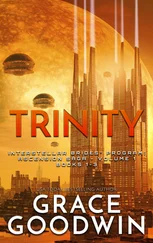“Tell the Premier that despite our efficiency, we do not stock hunting dogs in these places,” the President said. He was near exhaustion. But he heard a chuckle, also small, emerge out of Cherepovets.
“God be with you, Mr. President.”
“And Destiny with you, Mr. Premier.”
The pause seemed to linger endlessly this time, as they tried to conclude the conversation.
“I am sorry, Mr. President,” the Premier said.
“I am sorry too, Mr. Premier.” The President blindly handed the phone upward, felt it taken away, and tried to force his exhausted brain to concentrate on the next step.
Sedgwick, listening from the doorway, glanced at the clock. It read 1900 Zulu.
• 1900 Zulu
Framed in the cockpit window, less than two miles away, the E-4 glimmered majestically in the muted sunlight. It was a handsome craft, the cockpit dome and the presidential compartment bulging white and dramatically out of its spine not entirely unlike the proud head of the eagle it represented. Alice could just make out the lettering—“UNITED STATES OF AMERICA”—stripped in blue across its ribs. The Stars and Stripes flew proudly on its tail, also visible. The E-4’s pilot was maneuvering now, swinging the massive tail this way and that in a desperate attempt to outrun his pursuer. But the Looking Glass had him cornered. Alice shivered. He grasped Smitty’s shoulder and felt the shudder run through him, too. Neither spoke.
Smitty had done a masterful job, one that normally would have been deserving of the highest praise. Alice refrained. The pilot would have been frightfully embarrassed at praise for this grim chore. The general would have found it impossible to give.
The E-4 was a much newer aircraft and twice as large as the Looking Glass. The two aircraft flew at roughly the same velocity, just under the speed of sound, and it was no simple feat to catch an aircraft flying your speed. Smitty, however, had one immense advantage. The pilot of the E-4 had continued to try to protect himself and his precious cargo from lengthy runs through the radiation. Alice and Smitty had long since abandoned themselves to that risk, cutting directly through the hottest clouds, forcing the E-4 closer and closer to the fallout so the huge plane would alter its course slightly. On each adjustment, the Looking Glass gained. Alice felt a pang of pity for the pilot with the black eyepatch. He was a friend. They were forcing him to choose between the insidious threat of the radiation and the puzzling threat of the Looking Glass. The general was not certain which choice he would have made. Would he have played the odds that his pursuer would not have the guts for the final suicidal plunge?
Alice barely heard the figure approaching behind him, and when a hand landed lightly on his arm, he flinched in surprise. He turned to see his communications officer, her mouth agape as her eyes held transfixed to the vision of the command plane looming in front of them.
“Lieutenant?” Alice asked quietly.
The woman shook her head, as if to bring herself back from some far place, and mumbled, “I’m sorry, sir.” Her eyes remained on the E-4. “The civil-defense station at Olney has made direct contact. They’re on the radio now, trying to arrange a patch to the E-4.”
“Lieutenant—” the general began, subduing his irritated disbelief in condescending tones.
“They want to talk to you, sir,” she continued in a monotone.
“Jee-zuz Kee-rist, lieutenant!” Alice suddenly fumed. “Civil defense? Can’t you keep those fucking bureaucrats off my back? I’m a little busy!” He drew a deep breath to regain control of himself and then placed a comforting hand on the woman’s shoulder. “Lieutenant, it’s over,” he said flatly. “Go back and handle it for me, will you please? Tell them to crawl under their desks and put a piece of paper over their heads. It’s over.”
Kazakhs was bone-aching tired, almost giddy from the punishment to body and soul that he had taken now for thirteen hours. In the distance he saw the storm gathering and threatening to cut off their most direct course to Fiji. Their only course to Fiji, he thought sourly. He was not precisely sure where they were. But from the time, shortly after 1900 Zulu, and the rough course they had followed since the decompression, he estimated they were about 10 degrees north of the equator at about 170 degrees west longitude. Ten degrees from the dateline, he thought wistfully. Ten degrees from tomorrow. The Marshall Islands should be about a thousand miles west, somewhat closer than Fiji. But the Marshalls were a dreadful collection of rocks and atolls, scattered hopelessly, their average elevation a mere five feet above sea level. The islands also were directly behind the storm. The pilot glanced left, where the view was more inviting. His eyes moved across the increasingly frothy ocean, its swells pushed higher and angrier by the approaching storm. Suddenly his eyes jarred to a stop.
“Whoo-e-e-e-e,” he said, nudging Moreau. “Take a look at that.”
Moreau leaned across him. She scanned through the white-laced blue and then locked on the aircraft carrier. It was a massive beast, several football fields long. Still, in the distance, it looked like a child’s toy floating in a huge tub. Kazakhs could feel Moreau tighten.
“Mmm-uhm,” Kazakhs clucked. “I always wanted to land on one of those babies. You think they’d take a wounded old Buff?”
“They’ll take us, all right,” Moreau replied coldly.
“Turn on the radio and see whose side they’re on.”
“What the devil difference does it make?” Moreau snapped. “You think anybody’s on our side? We’re in deep trouble.”
Kazakhs turned toward her and nodded silently, but his eyes carried no recognition of the threat. He looked exhausted. “Still think I’ll take stars and stripes over a hammer and sickle,” he said.
“Damn you, Kazakhs, we’re up to our ass in alligators and it doesn’t make much difference if they’re commie alligators or not.” She switched on the radio, adjusting it for incoming traffic. Almost instantly, their earphones were squawking.
“Polar Bear One, Polar Bear One …”
“Jesus Christ, we’re famous,” Kazakhs said in surprise. Moreau glared at him.
“…USS Ticonderoga calling Air Force B-52 Zero-Two-Six-Six-Four. Acknowledge…”
Kazakhs froze on the recitation of the identification number of their tail. He reached quickly toward Moreau, as if to stop her from replying. “I’m not talking to anybody,” she snapped into the intercom. “I want to hear what they have to say.”
“…Zero-Two-Six-Six-Four, you will ditch in the sea. Escort aircraft and air-sea rescue have been launched. Repeat, you will ditch in the sea. We have NCA orders to bring you down or shoot you down. Acknowledge….”
Kazakhs glanced hurriedly down at the carrier. Two small specks, one after the other, lifted off the deck. He banked the B-52 straight toward the approaching storm.
Alice could feel the ripple of the E-4’ s wash now. The plane’s four immense engines, 747 engines, kicked churning air back at them like a pickup spinning out of gravel. They had closed to about a quarter-mile. The E-4’ s pilot occasionally bobbed and weaved, feinting a dive, bluffing a turn, but mostly he raced full throttle. They had him and he knew it. The general had a sick, sinking feeling in his gut and he was certain Smitty did, too. They both had spent time aboard the other plane. Alice could envision the E-4’s staff still hunched over their machines, just as his people hunched over theirs, doing their jobs even as the end neared—men and women, friends and acquaintances, golf partners and old colleagues who had paused in the halls of SAC headquarters just yesterday and asked: How’s Madge?
Читать дальше












